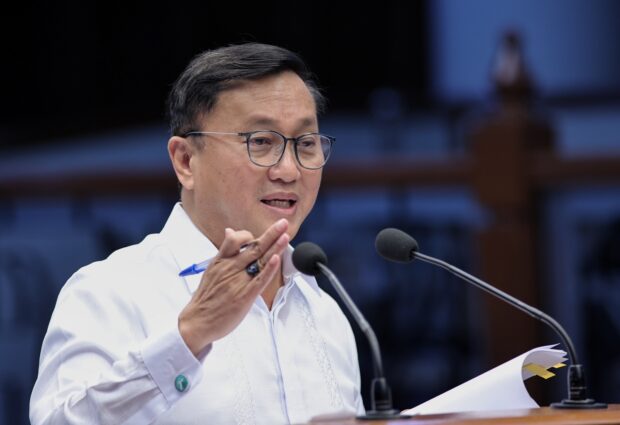
Sen. Francis Tolentino (Joseph B. Vidal / Social Media Unit)
MANILA, Philippines — Senator Francis Tolentino has proposed amendments to the Senate’s contempt powers, aiming to provide resource persons more opportunities to be heard before being cited in contempt and detained.
In filing Senate Resolution No. 889 on Tuesday, Tolentino proposed amending Sections 16 and 18 of Resolution No. 5, or the Rules of Procedure Governing Inquiries In Aid of Legislation.
Tolentino’s amendments introduced specifying the period in which a witness can submit their statement before an inquiry, and limiting when and how they could be cited in contempt.
This was based on a recent Supreme Court (SC) ruling where it declared that the Senate committed a grave abuse of discretion when it cited in contempt and ordered the arrest of Pharmally executives Lincoln Ong and Michael Yao Hung Ming.
According to the SC, an opportunity to be heard must first be accorded to the witness before the Senate can issue a contempt order.
The High Court also pointed out that the Senate’s exercise of such power must be subject to three limitations: the inquiry must be “in aid of legislation;” the inquiry must be conducted in accordance with its duly published rules of procedure; and “the rights of persons appearing in or affected by such inquiries shall be respected.”
“To be consistent with the relevant Supreme Court rulings on the matter so as not to repeat what happened in the two cases where the exercise of contempt power of the Senate has been reviewed by the Supreme Court, it is high time for the Senate to amend relevant sections of Resolution No. 5,” said Tolentino.
Tolentino’s proposed amendments are as follows:
Section 16 states that all persons under investigations or witnesses in the inquiry may submit a copy of their written statement “not less than 24 hours in advance of the hearing at which the statement is to be presented.”
But under Tolentino’s amendments, the period of submission was specified to 15 days.
All persons under investigations or witnesses in the inquiry may submit a legal brief or a memorandum summarizing their position to the subject within a non-extendible period of 15 days.
Upon expiration of the period, the Senate committee will then come up with its report regardless of whether a memorandum was submitted.
Meanwhile, in Section 18, which involves the Senate’s contempt powers, Tolentino proposed that no witness appearing in an inquiry shall be cited in contempt without being given the opportunity to be heard.
Should a witness be cited in contempt, the Senate committee chairman must first issue an oral order or a show cause order answerable within three days allowing the witness to explain why they should not be cited in contempt.
The person cited in contempt may then file a motion for reconsideration — which should not exceed 15 pages — within five days from the day the contempt was ordered.
“A majority of all the members of the committee shall be necessary to reverse or modify the aforesaid order of contempt,” Tolentino’s amendment read.
Once arrested and detained, the period of detention shall only last until the termination of the legislative inquiry where the individual was cited in contempt.

